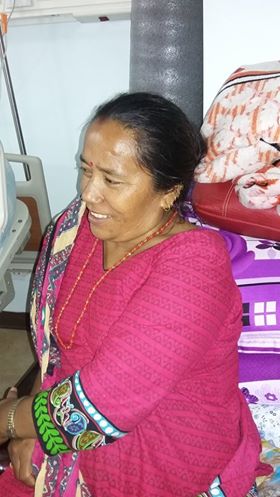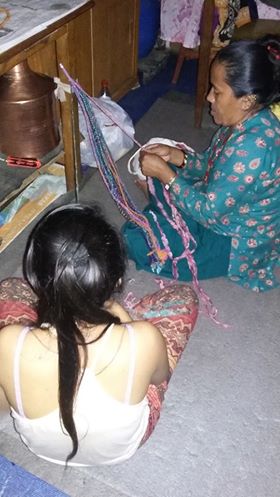
Kesh Maya
Kesh Maya had a similar upbringing like Maya, but in another village. The big difference is that Kesh Maya never went to school. Her parents didn’t think it was any use to send her to school since she was a girl. They were poor and only prioritized education for their sons. Kesh Maya spent her early years helping out in the household.
To tell the rest of her story I also need to tell about her husband Prem’s life.
When we moved to Nepal we often went by taxi since it’s a fairly cheap and easy way to commute in Kathmandu. Prem and his family lived in our neighborhood and he was driving a taxi, so after going with him a few times, we got his phone number and called him whenever we wanted to go somewhere.
We were invited to his home and got to know Kesh Maya, even though she doesn’t speak a word of English, their son and daughter and Prem’s adorable mother who is, according to Prem, 95 years old. Here in Nepal people rarely know how old they are, so 95 is probably not entirely correct, but she is very, very old.
All of them live in a tiny room with an attached tiny kitchen and it’s always very tidy and clean.
Prem has told me that he was very much in love with a girl in his village who he intended to marry, but the night after Holi, the festival of colors, she unexpectedly died in her sleep. He was completely devastated and to make matters even worse his father got hit by a bus and died short after. At this point Prem was in deep depression and refused to leave the house. Weeks passed by and his mother was sick of worry, trying to figure out how she could help him.
One day Prem’s mother brought a stranger to their house, a young Kesh Maya. She was now 18 and ready to get married and the mother thought she could get him out of bed and back to life. But Prem reacted with panic and escaped to Kathmandu. Prem and Kesh Maya was seen as married by the community even though they never had a formal wedding.
Prem started working as a trekking guide and soon he met Emma from UK and fell in love. Along the way he did his duty and had two children with Kesh Maya, who still lived in the village with his mother.

Kesh Maya and her daughter Muna is making necklaces of vintage saris
Prem married Emma and tried to live in UK for five years, but he could never come to terms with the western lifestyle. Emma lived for some time in Nepal, but she felt isolated and missed her life in Europe. Finally they decided to separate, but they are still the best of friends.
I can’t even begin to imagine how Kesh Maya felt about all this, but growing up without education and no input from the outside world makes her thoughts so different from mine. Was there any jealousy? Was she missing Prem? Did she feel abandoned? It’s hard to say. These complex emotions are difficult to put words on.
It’s easy to blame Prem for leaving Kesh Maya and the children for a few years, but Prem is one of the good guys and the traditions and expectations from the community is very different from what we are used to.
A lot of young people are still forced in to marry someone in their own caste they don’t know and love and divorce is very rare. Sometimes they fall in love and strive together as a family, sometimes they walk alongside each other on the bitter road and sometimes they leave their spouse to live with someone else. Since divorce is a shame they separate and leave the family behind with no obligations.
Prem took his responsibility and moved Kesh Maya, his children and his mother for a better life in Kathmandu. Kesh Maya has never had a work outside the home. She is very shy, but I’ve always hugged her when we meet and now she knows what to expect every time we see each other.
Prem has his taxi and some trekking trips, but giving the children a proper education is hard for them financially. The daughter Muna, Moon, is now going to college learning computer science and we are all very proud of her. One of our regular customers in The Netherlands, dear Diana, donated enough money for us to buy a computer for Muna, so she can study properly.
Kesh Maya has to stay home and take care of Prem’s mother since she is so old now that she is not able to walk and only stays in the house. Therefor it’s impossible for Kesh Maya to get a job and help Prem provide for the family.
For the last year I’ve been able to give Kesh Maya some handicraft work she can do at home and the tears of gratitude in her eyes she gets every time I give her the payment, money she has earned all by herself, is just heartbreaking and I always wish I could give her more work.
With the help of Earth Divas I can now give work to Kesh Maya so she can earn her own money and feel proud about herself. A very important feeling every human being should be able to experience.